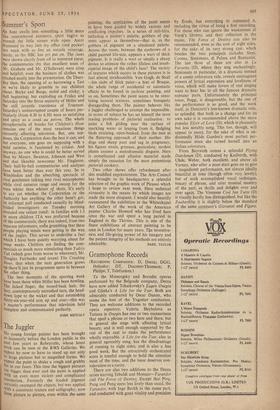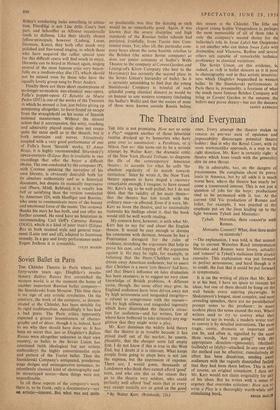Gramophone Records
(RECORDING COMPANIES: D, Decca; DGG, Heliodor; DT, Ducretet-Thomson; P, Philips; T, Telefunken.) To the Mussorgsky and Borodin operas performed by the Belgrade company, Decca have now added Tchaikovsky's Eugen Onegin and Glinka's A Life for the Tsar. Both are admirably conducted by Oscar Danon, who seems the best of the Yugoslav conductors. They are welcome additions to the recorded opera repertory. Valeria Heybalova as Tatiana in Onegin has one or two mannerisms that spoil a phrase or two here and there, but in general she sings with affecting lyrical beauty, and is well enough supported by the rest of the cast to make the' performance wholly enjoyable. A Life for the Tsar, also in general agreeably sung, has the disadvantage of running to eight sides, and is also a less good work. But the attractively orchestrated score is tuneful enough to hold the attention most of the time, and the issue deserves con- sideration as a rarity. There are also two additions to the Decca series starring Tebaldi and Monaco—Turandot and The Force of Destiny,. Except that Ping, Pang and Pong seem less lively than usual, the Turandot, with Inge Borkh in the name part, and conducted with great vitality and precision by Erede, has everything to commend it, including the virtue of being a first recording. For those who can ignore the weaknesses of Verdi's libretto, 'and their reflection in the music, The Force of Destiny can also be recommended, even at the cost of eight sides, for the sake of its very strong cast, which besides the two principals includes Siepi, Corena, Simionato, di Palma and Bastianini. The last three of these are also in La Favorita (D), where they sing enchantingly. Simionato in particular, in a dramatic instead of a comic coloratura role, reveals unimagined powers of lyrical expression and loveliness of voice, which will make lovers of real singing want to hear her in all the famous dramatic soprano parts. Unfortunately the principal tenor, Poggi, is disagreeable, but the rest of the performance is so good, and the work itself, in Donizetti's less-known dramatic vein, so splendid, that both as a change and for its own sake it is recommended above the more popular Elixir of Love (D), which is pleasantly but less notably sung. This too, though, will appeal to many, for the sake of what is un- doubtedly Hilde Gueden's most perfect per- formance since she turned herself into an Italian coloratura. From Bayreuth comes a splendid Flying Dutchman (D), conducted by Keilberth, with Uhde, Weber, both excellent, and above all Varnay, who after a poor start goes on to give a magnificent performance, not always ideally beautiful in tone (though often very lovely), but of such accomplished vocal technique, beauty of phrase, and utter musical mastery of the part, as thrills and delights over and over again. The Viennese Cosi fan Tutte (D) is vocally hardly less distinguished, but like the Zauberflote it is slightly below the standard of the same company's Giovanni and Figaro.
BLihm's conducting lacks something in anima- tion, Fiordiligi is not Lisa della Casa's best part, and Schoeffler as Alfonso occasionally tends to dullness. Like their ideally chosen fellow-principals, however (Ludwig, Loose. Dermota, Kunz), they both offer much very polished and fine-toned singing, in which those who have acquired the rather special taste for this difficult opera will tind much to enjoy. Dermota can be heard in Mozart again, singing several of the most famous' arias very beauti- fully on a medium-play disc (T), which should not be missed even by those who have the equally lovely group sung by Peter Anders.
Finally there are three short masterpieces of no-longer-so-modern neo-classical near-opera. Falla's puppet-opera El Retablo de Maese Pedro (DT) is one of the works of the Twenties in which he seemed at last, just before giving up composing altogether, to have found an escape from the stranglehold on his music of Spanish national mannerisms. Without the mimed action that it accompanies, this witty, touching and admirably played music does not create quite the same spell as in the theatre, but it both entertains and moves. Attractively coupled with a very good performance of one of Falla's finest 'Spanish' works, El Amor Brujo, it is highly recommended. Stravinsky's opera-oratorio Tr/low Rex is available in two recordings that offer the buyer a difficult choice. The one conducted by the composer (P), with Cocteau speaking the narrative of his own libretto, is obviously desirable both for its absolute authenticity and as a historical document, but despite its musically impressive cast (Pears, MU!, Rehfuss), it is vocally less full or satisfying than the version conducted by Ansermet (D), with Haefliger and Bouvier, who seem to communicate more of the beauty and emotional force of the music. The reviewer thanks his stars he has both, and can offer no further counsel. He need have no hesitation in recommending Carl Orff's Carmina Burana (DGG), which is a kind of poor man's (Edipus Rex in both musical style and general treat- ment (Latin text and-all), adapted to licentious comedy. In a gay and lively performance under Eugen Jochum it is irresistible.
COLIN MASON



































 Previous page
Previous page